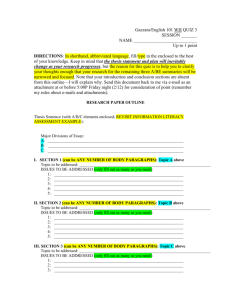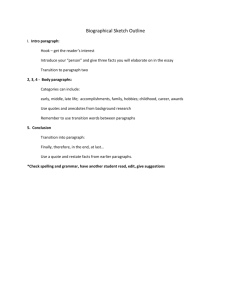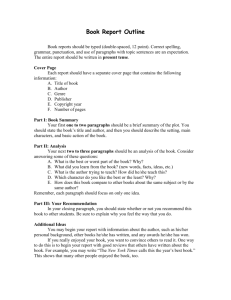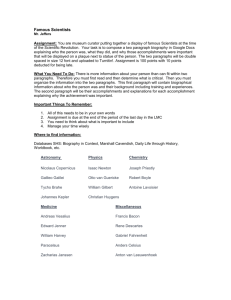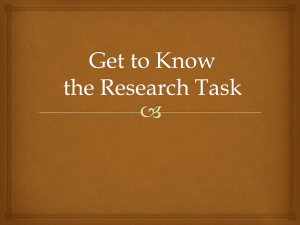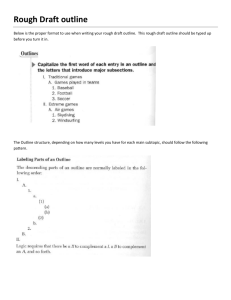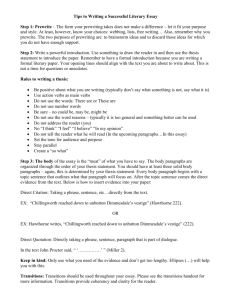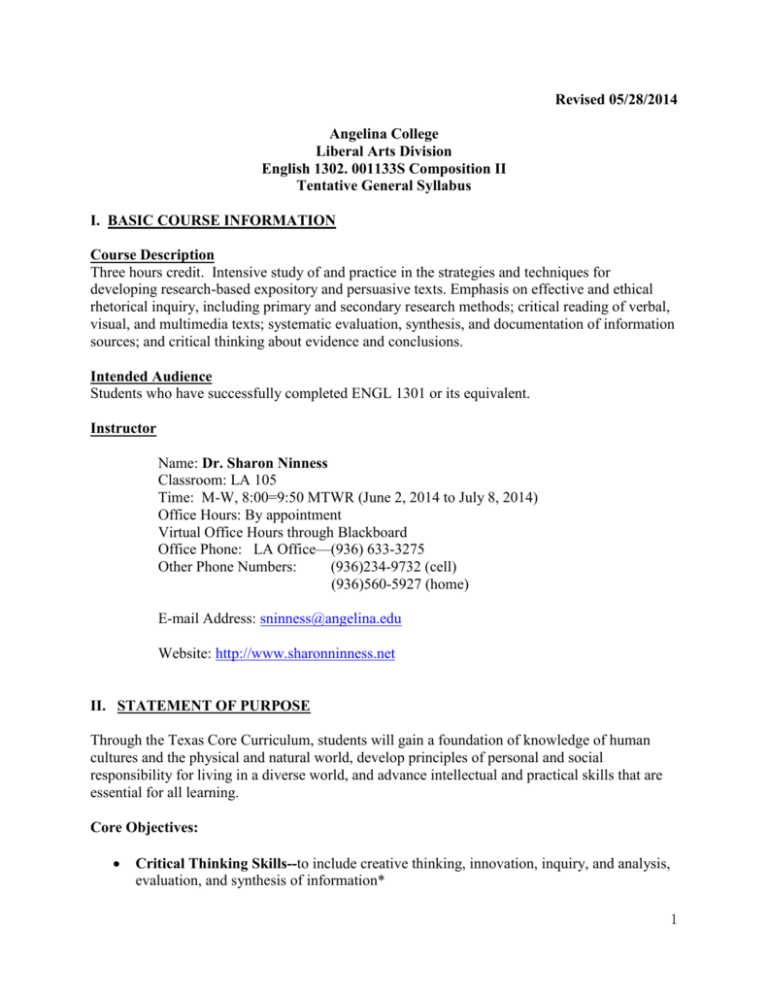
Revised 05/28/2014
Angelina College
Liberal Arts Division
English 1302. 001133S Composition II
Tentative General Syllabus
I. BASIC COURSE INFORMATION
Course Description
Three hours credit. Intensive study of and practice in the strategies and techniques for
developing research-based expository and persuasive texts. Emphasis on effective and ethical
rhetorical inquiry, including primary and secondary research methods; critical reading of verbal,
visual, and multimedia texts; systematic evaluation, synthesis, and documentation of information
sources; and critical thinking about evidence and conclusions.
Intended Audience
Students who have successfully completed ENGL 1301 or its equivalent.
Instructor
Name: Dr. Sharon Ninness
Classroom: LA 105
Time: M-W, 8:00=9:50 MTWR (June 2, 2014 to July 8, 2014)
Office Hours: By appointment
Virtual Office Hours through Blackboard
Office Phone: LA Office—(936) 633-3275
Other Phone Numbers:
(936)234-9732 (cell)
(936)560-5927 (home)
E-mail Address: sninness@angelina.edu
Website: http://www.sharonninness.net
II. STATEMENT OF PURPOSE
Through the Texas Core Curriculum, students will gain a foundation of knowledge of human
cultures and the physical and natural world, develop principles of personal and social
responsibility for living in a diverse world, and advance intellectual and practical skills that are
essential for all learning.
Core Objectives:
Critical Thinking Skills--to include creative thinking, innovation, inquiry, and analysis,
evaluation, and synthesis of information*
1
Communication Skills—to include effective development, interpretation and expression
of ideas through written, oral, and visual communication*
Empirical and Quantitative Skills—to include the manipulative and analysis of
numerical data or observable facts resulting in informed conclusions
Teamwork—to include the ability to consider different points of view and to work
effectively with others to support a shared purpose or goal*
Personal Responsibility—to include the ability to connect choices, actions, and
consequences to ethical decision-making*
Social Responsibility—to include intercultural competences, knowledge of civic
responsibility, and the ability to engage effectively in regional, national, and global
communities
*These are the required objectives for the course.
Learning Outcomes:
Demonstrate knowledge of individual and collaborative research processes
Develop ideas and synthesize primary and secondary sources within focused academic
arguments, including one or more research-based essays
Analyze, interpret, and evaluate a variety of texts for ethical and logical uses of evidence
Write in a style that clearly communicates meaning, builds credibility, and inspires belief
or action
Apply the conventions of style manuals for specific academic disciplines (e.g., APA,
CMS, MLA, etc.)
III. ASSESSMENT MEASURES (final formulation in progress)
IV. INSTRUCTIONAL PROCEDURES:
A. Methodologies common to all sections:
Methodologies that may be utilized in presenting course content include in class or online
lecture notes, paper and pencil or online grammar exercises or research exercises that
give immediate feedback, in person or e-mail workshops for student writings in progress,
audio-visual presentations for view in class or outside of class, online discussions
(synchronous or asynchronous), student presentations to groups or to the instructor only,
and guess participants.
B. Methodologies determined by the instructor:
Class or online lecture notes, paper and pencil or online grammar exercise or research
exercises, audio-visual presentations for view in class or outside of class, cooperative
learning activities, and class discussions.
2
V. COURSE REQUIREMENTS AND POLICIES:
A. Required Texts and Other Supplemental Materials
1. Print Materials:
Delbanco, Nicholas, and Alan Cheuse. (Eds.). Literature: Craft & Voice. 2nd ed.
New York: McGraw-Hill, 2012. Print.
Hacker, Diana, and Nancy Sommers. The Bedford Handbook. 9th ed. Boston:
Bedford /St. Martin’s, 2014. Print.
Steinbeck, John. Of Mice and Men. New York: Penguin Books, 1993. Print.
2. Web-Based Materials:
Brooks, Gwendolyn. “The Ballad of Rudolph Reed.” PoemHunter.com. Poem
Hunter. Com., 16 Jan. 2014. Web. 16 Jan. 2014.
Brooks, Gwendolyn. “The Bean Eaters.” Poetry Foundation.org. Poetry
Foundation, 2014. Web. 16 Jan. 2014.
Chekhov, Anton. “The Bear.” Full text of “Plays by Anton Chekhov, Second Series.”
Archive.org, Institutional Support: Library of Congress, 10 Mar. 2001. Web. 14
Jan. 2014.
**The Tentative Calendar, which is attached to this syllabus, lists the specific URL’s for the
web-based materials, and these also will be posted on Blackboard.
B. Optional Materials:
Gibaldi, Joseph.(Ed.). MLA Handbook for Writers of Research Papers. 7th ed.
Boston: Modern Language Association, 2009. Print.
Harmon, William. A Handbook to Literature. 12th ed. Boston: Pearson-Longman, 2011.
Print.
C. Other Required Materials:
1. Pen/pencil for note taking
2. Yellow highlighter
3. Three ring binder with 8 dividers for maintaining handouts. (The dividers will
designate the following sections: Notes, Handouts, MLA Format, Author
Information, Literary Elements Sheets, Poetry Synopses, Writing Assignments,
and Writing Log)
4. Flash drive for saving written compositions from the computer
5. Student ID required to check out library materials and for access to computer lab
3
6. Access to a word processor, printer, and the INTERNET
7. Dictionary
D. Specific Equipment Required by Instructor:
1. DVD player
2. VCR player
3. Video projector
4. Computer
E. Specific Assignments Required for All Students Enrolled in English 1302:
1. Major research paper (on a topic related to John Steinbeck’s novel Of Mice and Men)
2. Minor research paper (character analysis related to Tennessee Williams’ The Glass
Menagerie
3. Writing log
4. In-class writing assignments
5. Homework assignments: Reading selections, study questions, journal entries, etc.
6. Daily quizzes
7. Graphic organizers of literary elements in dramas, short stories, and the novel
8. Poetry synopses
9. Author chart
10. Examinations (3)
11. Research assignments
12. Short writing assignments (completed in-class or as homework)
All essays and homework assignments must be typed using Modern Language
Association (MLA) format, which includes double spacing, a header, a running head, and
the use of a 12 c.p.i. Times New Roman font. Refer to pages 656-661 in The Bedford
Handbook, 9th ed. (2014) and to pages 181-185 in Literature: Craft & Voice, 2nd
ed.(2012) for information regarding MLA formatting.
In addition to being submitted via hard copy, each paper must be submitted electronically
to the following e-mail address: sninness@angelina.edu on the date that it is due. Journal
entries and short essays WILL NOT BE ACCEPTED past the day that they are due.
Daily assignments and homework assignments must be turned in during class on the
dates that they are due—they WILL NOT BE ACCEPTED past the date that they are
due. Research papers will NOT BE ACCEPTED MORE THAN ONE WEEK LATE. A
total of 10 points will be deducted from the final grade on the paper for each day that it is
late. Do not arrive in class and then leave to print a copy of your paper. It is your
responsibility to come prepared with a hard copy of the paper. All papers are due at the
beginning of class.
4
F. Additional Specific Assignments that May Be Required:
1. One presentation requiring outside research
2. Grammar exercises as needed
G. Schedule for Course (Appropriate due dates, schedules, and deadlines)
SEE TENTATIVE CALENDAR.
H. Course Policies—This course conforms to the policies of Angelina College as stated in
the Angelina College Handbook.
Academic Assistance – If you have a disability (as cited in Section 504 of the Rehabilitation Act
of 1973 or Title II of the Americans with Disabilities Act of 1990) that may affect your
participation in this class, you should see Karen Bowser, Room 208 of the Student Center. At a
post-secondary institution, you must self-identify as a person with a disability; Ms. Bowser will
assist you with the necessary information to do so.
Angelina College (AC) admits students without regard to race, color, religion, national origin,
sex, disability, or age. Inquiries regarding the non-discrimination policies of AC should be
directed to: Dr. Patricia McKenzie, Vice President and Dean of Instruction, 3500 South First,
Lufkin, TX 75904, telephone 936-633-5201.
Attendance –From the Angelina College Policy Manual: Students are required to attend all
lecture classes regularly and punctually. Responsibility for work missed because of illness or
extracurricular activity is placed upon the student.
A true evaluation of the teaching-learning situation involves a correlation between attendance
and progress. It is the responsibility of the student to attend all classes. A record of attendance
will be kept for all classes by the instructor.
It is the responsibility of the student to withdraw officially in the College District Admissions
and Registrar’s Office from a class the student no longer desires to attend.
College District instructional standards allow the instructor to set the educational objectives and
requirements for each course. The student who does not meet these requirements because of
excessive absences may be dropped by the instructor on a notice to the College District
Admissions Office using either a first or second drop slip. The position of the instructor on
submitting a non-attendance drop is stated in the course syllabus.
Excessive absences are defined as three or more consecutive absences or four or more
cumulative absences from regularly scheduled class periods. The summer terms call for two
or more consecutive, or three or more cumulative absences. A three-hour night class counts as
two class periods.
5
Students will not be dropped and will be allowed to make up work for absences because of (1)
College District authorized and sponsored activities and (2) religious holy days. It is the
student’s responsibility to arrange for make-up work with the instructor and to complete it within
a reasonable time.
In accordance with the Texas Education Code, each student is allowed to be absent from a class
for the observance of a religious holy day. A “religious holy day” means a holy day observed by
a religion whose places of worship are exempt from property taxation under Section 11.20, Tax
Code.
The student must notify the instructor of each class of the anticipated absence no later than the
15th calendar day after the first day of the semester. A student who is excused under this section
must complete all assignments or missed examinations at the direction of the instructor.
The form for notification of absences is in the Office of Admissions and includes the following:
1.
2.
3.
4.
5.
6.
7.
8.
Student name and identification number,
Name of religious institution and tax code number,
Name and date of holy day(s),
Classes to be missed,
Schedule for delivery of form by student to instructor(s),
Conditions and deadlines for completing missed assignments,
Instructor’s signature and date, and
Student’s signature and date.
A student dropped because of excessive absences will be notified by mail by the College District
admissions office and will be directed to obtain a readmit form and seek the approval of the
instructor for re-admission. All students in developmental education must obtain approval of the
instructor and the vice president/dean of instruction.
A student who fails to contact the College District admissions office within one week of the date
the notice was mailed will be dropped permanently from class.
All make-up work is at the discretion of the instructor.
Additional Policies Established by the Individual Instructor:
If this course is a hybrid, these in-class policies apply as usual, and they apply when interacting
with other students or faculty on-line.
6
You should attend class regularly. Each evening class counts as two regular day
classes. If you miss 3 consecutive day classes or accumulate a total of 4
absences during the summer semester, you will be dropped from this course.
Your fellow classmates will be counting on you to be present during group
activities, and your instructor will be counting on your contributions to class
discussions, peer editing activities, and cooperative learning activities. Therefore,
you will not want to let your classmates or your instructor down by being absent
from class. Your contributions to class discussions and activities are extremely
valuable!
Grades on reading quizzes and/or cooperative learning activities will be taken on
a weekly basis, and these minor grades will be recorded as zeroes if you are
absent from class. You will be allowed to drop at least three of your lowest quiz
grades.
If you attend every class for the full amount of time duirng the semester, you will
receive 2 points added to your final grade at the end of the semester. These added
points could possibly help you obtain a higher letter grade for the course.
You should attend class regularly. Attendance will be taken at the beginning and
at the end of class. Try to be on time. If you are consistently late, you will not
be admitted to the classroom. If you must leave class early, you must discuss
your departure with me before class starts! If you simply get up and walk out of
class, you will be counted absent; if you do this twice, you will be dropped. Do
not get up and discuss your leaving with me as you are leaving. Do it before the
class begins. Class is over when I dismiss class.
It is your responsibility to be prepared for and to be informed about class
assignments. If you miss a class, be prepared when you return to class. Your
Tentative Calendar is the document I use to organize the class, so look at your
copy of it to know what you need to do to be prepared for class when you come
back. This Syllabus and the Tentative Calendar will be posted on Blackboard in
the Course Content area. Do not return to class and explain that you were absent
as your excuse for not being prepared. Look at the calendar, check Blackboard,
and be prepared when you return to class. Do not ask me if we are doing anything
important in class; look closely at the Calendar and make your own judgment, and
of course, experience the consequences.
Make-Up Policy
You will not be allowed to make-up any minor assignments that you do not
complete and turn in on time.
You will be allowed to make up one major examination within one week of the
day it was originally administered to the class.
7
You may turn in your major research paper late, but for every day it is late, your
instructor will deduct 10 points from the research paper grade. You must
complete the major research paper in order to get credit for this course. Failure to
complete the major research paper will result in a grade of F for the course.
If you have excessive absences (absences for 2 or more consecutive day
classes or for a total of 3 or more classes during the summer semester), you
will be dropped, and you will not be readmitted.
.
If you have any work to make up because of an absence, that work must be
completed within one week of your return to class. Please be sure to initiate
contact with me to make your arrangements. You cannot make up work after you
have acquired absences for 2 or more consecutive day classes or for a total of 3 or
more classes during the summer semester.
ANY INSTANCE OF PLAGIARISM, WHICH IS THE UNACKNOWLEDGED
USE OF ANYONE ELSE'S WORK--PUBLISHED OR UNPUBLISHED--OR
CHEATING OF ANY KIND, WILL RESULT IN IMMEDIATE AND
IRREVOCABLE FAILURE FOR THE ENTIRE COURSE.
Behavioral Expectations
You are expected to be courteous and respectful in class toward the instructor and
other students at all times.
You are expected to arrive to class on time. If extentuating circumstances prevent
you from arriving to class on time, you should enter the room quietly and pick up
any needed hand-outs from the table. Do not ask to make up a reading quiz if it
has already been administered, and do not interrupt class actiivities by asking the
instrutor what you have missed.
Arrange for someone to get your assignments for you if extenuating
cirucmstances prevent you from being able to attend class. Leave a message with
the instructor that you are going to be absent in advance of the missed class.
Remember that you will be dropped from the course after you have acquired
absences for 2 or more consecutive day classes or a total of 3 classes during
the summer semester.
Do not bring activated pagers or cellular phones to class. Do not use phones
in class, and do not read text messages or send them in class.
In order to attend this class, one must be enrolled. You may not bring children or
friends to class. It is the policy of Angelina College that you can not bring
children to class.
8
Treat everyone in this class in a respectful manner. Listen respectively to others’
ideas. When you disagree with others’ views, express your disagreement in a
tactful, polite manner.
Avoid holding up the commencement of class by conversing with others.
Classroom behavior should not interfere with the instructor’s abililty to conduct
the class or the abilities of other students to learn from the instructional program.
Unacceptable or disruptive behavior will not be tolerated. Students who disrupt
the learning environment will be asked to leave class and may be subject to
judicial, academic, or other penalties. This prohibiiton applies to all instructional
forums, including electronic, classroom, labs, discussion groups, field trips, etc.
The instructor shall have full discretion over what behavior is appropriate/
inappropriate in the classroom.
You may not leave the classroom after an exam or quiz has been handed out.
Please gather tissues or other needed materials and make bathroom trips before
the test document is handed out.
I encourage participation in class discussion; that is an integral part of this course.
However, constant comments or interruptions to a lecture are a distraction to your
classmates, and these will not be allowed.
I encourage you to talk to me about the course and to stop me during a lecture in a
respectful manner to ask questions if you do not understand the material. If you
are having difficulties or have special needs, please bring them to my attention
right away.
I expect you to conduct yourself in a polite and considerate manner at all times. If
you fail to do so, if you disrupt the class in any way, you will be directed to leave
immediately. If you disrupt the class a second time, you will be dropped, and you
will not be readmitted.
These policies are applicable to everyone throughout the entire semester.
VI. COURSE CONTENT
Content will include rhetorical inquiry, including primary and secondary research
methods, critical reading of verbal, visual, and multimedia texts, systematic evaluation,
synthesis, and documentation of information sources, and critical thinking about evidence
and conclusions.
9
VII. EVALUATION AND GRADING
A. Grading Criteria:
20% Daily Assignments:
Daily quizzes, daily assignments, in-class writing assignments,
homework assignments, presentations, writing log, peer editing
activities, and cooperative learning activities.
**These assignments cannot be made up if you miss class.
20% Writing Assignments: 1 minor research paper (weighted as 3 grades) and writing
assignments completed in class or as homework (1 grade)
60% Major Examinations: 3 major examinations. In addition to these, the major research
paper will count as a major examination grade. Failure to
complete the major research paper will result in a grade of F
for the course.
The papers assigned for this class must be computerized in correct MLA format.
Quizzes and in-class writing assignments cannot be made up or taken early. Quizzes may be
given without prior notification. They will cover readings previously assigned but not
necessarily previously discussed, or lecture or video content from a previous class period, so it is
important that you attend class, pay attention, take notes, watch videos, and keep up with your
reading assignments, reading carefully and thoroughly. If you miss a quiz, you will receive a
grade of zero; a quiz cannot be made up or taken early because I automatically drop 3 of your
lowest daily grades. These dropped grades should adequately address the issue of missing
quizzes. Your assigned essays must be computerized. They will be evaluated on fulfillment of
the assignment. The criteria for essays include correct organization, content, grammar and
mechanics, formatting, and documentation. All essays MUST follow MLA format.
**Ten points per day (including weekends) will be deducted from the grades on late
papers.
B. Determination of Grade (Assignment of Letter Grades)
A (90-100)
B (80-89)
C (70-79)
D (60-69)
F (59 or below)
Excellent.
Good
Average
Minimum passing
Failure
10
Standard Grading Policy for the English Department for all Essays Assigned
A–excellent. Great organization and exceptional content with no more than one major error.
A+ = 98, A = 95, A- = 92, A- - = 90
B–above average. Effective organization and good content with only one or two major errors.
B+ = 88, B = 85, B - = 82, B - - = 80
C–average. Adequate organization and clear content with no more than 3 major errors.
C+ = 78, C = 75, C - = 72, C - - = 70
D–below average. Either lacks content and/or organization or has many major errors. More
than 4 major errors drops the grade to an F.
D+ = 68, D = 65, D - = 62, D - - = 60
F–failing. Shows little or no effort. Contains 4 OR MORE major errors.
F+ = 58, F = 55, F - = 52, F - - = 50 or lower
0–no grade. Did not turn in work, plagiarized an essay, or did not write on the assigned topic
Please note: In the case of a plagiarized essay or research paper, a student may be
dismissed from this course with an F.
Major errors include the following:
1) Sentence structure errors: fused, comma splice, fragment; and
2) Agreement errors: verb agreement errors and pronoun case agreement.
Examples of major errors:
CS–comma splice
The boy ran, he fell down.
Fr–fragment
Crying out as he fell on the sidewalk.
Fr Error- fragment error
Although he was not hurt badly; everyone stopped
to help him.
RO–run on or fused
He scraped his right knee it was bleeding.
Pron.--pronoun error in agreement
Him started laughing at hisself.
S/V–subject/verb agreement
Everyone laugh with him.
11
VIII. SYLLABUS MODIFICATION:
The instructor may modify the provisions of the syllabus to meet individual class needs by
informing the class in advance as to the changes being made. The Calendar of material
covered and literary selections are subject to reorganization and change throughout the
semester.
IX. COURSE ADAPTATIONS
**Students with documented disabilities who need course adaptations for accommodations,
please make an appointment with me as soon as possible.
Academic Calendar
I 2014
Summer I Schedule
Summer
June 2
First class day
June 5
Fourth class day, official census day
June 9
Last day to drop or withdraw from a semester-length
course with a 70% refund
June 11
June 16
June 30
July 4
July 8
July 9
Last day to drop or withdraw from a semester-length
course with a 25% refund
Scholarship forms due for Fall
Last day to drop or withdraw with a grade of "W"
Independence Day Holiday - campus closed
Final examinations
Final grades due in Records Office by 1:30 p.m.
**Refer to the following pages for the Tentative Course Calendar.
12
Tentative Course Calendar for English 1302. 001133S Composition II—Summer I 2014
Assignments may be revised as needed.
Week 1
6-2-14
Mon.
Class #1
Activities:
--Completion of Student Data Sheet
--Provision of in-class writing sample
--Review of syllabus and tentative class calendar
--Discussion of characteristics of drama and general
drama terms
--Discussion of the Interpretation of drama
--Discussion of characterization
--Provision of background information on Susan
Glaspell and her one-act play “Trifles.
--Completion of first part of literary Elements Sheet
on “Trifles.”
6-3-14
Tues.
Class #2
Activities:
**Quiz on “Trifles”
--Discussion of “Trifles” (Literature: pp. 1005-1013):
analysis of literary elements in the play and
completion of a literary elements sheet
--Discussion of the historical development of drama
6-4-14
Wed.
Class #3
--Provision of background information on Anton
Chekhov
Activities:
**Due: Chart of farcical elements in "The Bear" by
Anton Chekhov
**Quiz on “The Bear”
Homework Assignment/s:
Read “Trifles” by Susan Glaspell
(Literature: pp. 1005-1013) and study
for a quiz on the play.
Begin work on writing assignment related
to “Trifles:” Mrs. Wright’s Testimony.
This assignment must be typed in MLA
format. A hard copy and electronic copy
of this assignment must be submitted by
the beginning of the next class. This
assignment is due on Thursday, June 5.
Organize a notebook with 8 dividers to
bring to the next class.
Homework Assignment/s:
Read “The Bear,” a one act play by
Anton Chekhov (Handout).
Study for a quiz on “The Bear.”
Complete chart of farcical elements
in “The Bear” as a prewriting activity
Homework Assignment/s:
Complete writing assignment on
“Trifles:” Mrs. Wright’s Testimony.
Begin working on the following
writing assignment: The Farcical
Elements of "The Bear" by Anton
Chekhov. This essay is due on
Monday, 6-9-14.
Read The Glass Menagerie by
Tennessee Williams: Scenes 1-5
(Literature: pp.1395-1414). You must
read the entire play by Monday, 6-914 (1395-1435). A quiz on the entire
play will be administered on Monday,
6-9-14.
Begin completing study questions on
the play—these are due on Monday,
6-9-14.
--Discussion of "The Bear": Analysis of literary
elements in the play and completion of a literary
elements sheet
--Discussion of the play’s farcical elements
--Discussion of the criteria for the writing
assignment: The Farcical Elements in “The Bear”
--Construction of web for organization of the essay
--Discussion of information that is considered to be
common knowledge versus information that needs
a citation in a paper.
--Provision of background information on Tennessee
Williams
13
6-5-14
Thurs.
Class #4
Activities:
***Due: Writing assignment related to “Trifles”-Mrs. Wright’s Testimony
--Discussion of strengths and weaknesses of
Tennessee Williams’s plays
-- Discussion of point of view as a literary element:
first person and third person (omniscient, limited
omniscient, and objective)
--Discussion of The Glass Menagerie: Analysis of
literary elements and completion of a literary
elements sheet (first part).
Homework Assignment/s:
Finish reading The Glass Menagerie
by Tennessee Williams: Scenes 1-7
(Literature: pp. 1395-1435). A quiz on
the entire play will be administered on
Monday, 6-9-14.
Complete study questions on the
play—these are due on Monday,
6-9-14
Complete writing assignment: Farcical
Elements in “The Bear” by Anton
Chekhov
--Discussion of criteria for character analysis paper:
Hand-out of criteria: 6 paragraphs
(introductory, thesis, three supporting, and
concluding paragraphs)
Rubric for evaluation of paper
Use of secondary source/s in introductory
paragraph
Use of one citation for primary source in
each supporting paragraph
Rubric for evaluation of introductory
paragraph
Rubric for evaluation of thesis paragraph
--Review of sample character analysis paper on The
Crucible by Arthur Miller
--Discussion of format for introductory, thesis, and
supporting paragraphs.
--Viewing of first part of video of The Glass
Menagerie
Week 2
6-9-14
Mon.
Class #5
Activities:
***Due: The Farcical Elements in “The Bear” by
Anton Chekhov
***Due: Complete study questions on The Glass
Menagerie
.
**Quiz on The Glass Menagerie
--Continued discussion of The Glass Menagerie:
Analysis of literary elements and completion of a
literary elements sheet (second part)
--Discussion of information to include in a thesis
paragraph of a character analysis paper: View
Homework Assignment/s:
Read “Everyday Use” by Alice
Walker (Literature: pp. 553-557) and
study it for a quiz.
Write the first two paragraphs of the
character analysis paper on The Glass
Menagerie by Tennessee Williams:
o introductory paragraph (refer
to the sample character
analysis paper for the format)
o thesis paragraph (type the
paragraph that was
14
PowerPoint.
--Write thesis paragraph
--Cooperative Learning Activity: Brainstorm character
traits of Tom, Amanda, and Laura. Provide examples
of these traits from the play. Discussion of these
traits.
--Discussion of how to use parenthetical citations to
document sources that are cited in a paper on a
play: Citing Drama handout--Discussion of ways to avoid plagiarism
--Discussion of construction of supporting paragraphs
in a character analysis paper
6-10-14
Tues.
Class #6
Activities:
**Quiz on “Everyday Use”
--Overview of material to study for Exam #1: Genre
of Drama
--Discussion of tragedy Aristotle's definition of a
tragedy, the attributes of a tragic hero, and the
unities (action, time and place)
--Discussion of The Glass Menagerie as a tragedy
o
completed in class)
a Works Cited page must be
included on a separate page
after the first two paragraphs. This page will list the
primary and secondary
sources that are cited in the
paper. Refer to the Works
Cited page of the sample
character analysis paper for
the MLA format.
Homework Assignment/s:
Complete the third paragraph (first
supporting paragraph) of the
character analysis paper on The Glass
Menagerie by Tennessee Williams
and add to the first two paragraphs
of the paper (introductory paragraph
and thesis paragraph)
--Overview of information on the short story that will
be covered: history of the narrative, literary
elements, and literary schools of thought.
--Provision of background information on Alice
Walker
--Discussion of Everyday Use by Alice Walker
(Literature: pp. 553-557): Analysis of literary
elements in the story and completion of literary
elements sheet
--Viewing of a slide presentation on “Everyday Use”
6-11-14
Wed.
Class #7
Activities:
**Due: First three paragraphs of character analysis
paper on The Glass Menagerie
(introductory, thesis, and first supporting
paragraphs) with Works Cited page
Homework Assignment/s:
Study for Exam #1 on Drama
Make needed revisions to first three
paragraphs and Works Cited page of
character analysis paper.
--Peer Review Activity: First three paragraphs of
character analysis paper on The Glass Menagerie.
--Discussion of kinds and types of poetry
--Discussion of poetry terms
--Provision of background information on Percy
Bysshe Shelley
--Discussion of “Ozymandias” by Percy Bysshe Shelley
(Literature: p. 994): Analysis of the poem as a
meditation and of the poetic devices used by the
15
poet
--Completion of a poetry synopsis sheet on the
“Ozymandias”
6-12-14
Thurs.
Class #8
Activities:
**Exam #1: Genre of Drama
--Discussion of how to construct a good concluding
paragraph for a character analysis paper:
PowerPoint presentation
--Writing of part of concluding paragraph
Homework Assignment/s:
Read “A Rose for Emily” by William
Faulkner (Literature: pp. 323-327).
Study “A Rose for Emily” by William
Faulkner and study the story for a
quiz.
Complete rough draft of character
analysis paper with 6 paragraphs and
a Works Cited page. This paper
should have an introductory
paragraph, a thesis paragraph, three
supporting paragraphs, and a
concluding paragraph. The Works
Cited page must include the primary
source and the secondary sources
that are cited in the introductory
paragraph.
--Provision of background information on William
Faulkner
Week 3
6-16-14
Mon.
Class #9
Activities:
**Due: Rough draft of character analysis paper with
6 paragraphs and a Works Cited page
** Quiz on “A Rose for Emily”
-- Viewing of short video of “A Rose for Emily”
-- Discussion of “A Rose for Emily” by William
Faulkner (Literature: pp. 323-327): Analysis of
literary elements in the story and completion of
Literary Analysis Sheet
--Discussion of the history of the narrative.
Homework Assignment/s:
Study for a quiz on kinds and forms of
poetry.
Read Section 1 of Steinbeck’s novel
Of Mice and Men.
Required novel:
Steinbeck, John. Of Mice and Men. New
York: Penguin Books, 1993. Print.
--Discussion of “Ode to the West Wind” by Percy
Bysshe Shelley (Literature: pp. 867-68): Romantic
elements in the poem, poem’s structure, and poetic
devices used by the poet
--Completion of a poetry synopsis sheet on “Ode to
the West Wind”
6-17-14
Tues,
Class #10
Activities:
** Quiz on Kinds and Forms of Poetry
**Quiz on “Ode to the West Wind”
Homework Assignment/s:
Read Chapter 2 of Steinbeck’s novel
Of Mice and Men.
16
--Discussion of literary schools of thought
--Discussion of “Ode to the West Wind” (Literature:
pp. 867-68): Review of the attributes of an ode,
analysis of the poem, and completion of a Poetry
Synopsis Sheet
Supplemental novel:
Steinbeck, John. Of Mice and Men. New
York: Penguin Books, 1993. Print.
--Provision of background information on Gwendolyn
Brooks
Read “The Bean Eaters” by
Gwendolyn Brooks (hand-out). A
copy of this poem is posted on
Blackboard, and one is available at:
http://www.poetryfoundation.org/poetryma
gazine/poem/17313
--Reflect on the poem’s themes.
Read “The Ballad of Rudolph Reed”
by Gwendolyn Brooks and reflect on
the poem’s theme. A copy of the
poem is posted on Blackboard, and
one is available at:
http://www.poemhunter.com/poem/theballad-of-rudolph-reed/
--Reflect on the poem’s themes.
6-18-14
Wed.
Class #11
6-19-14
Thurs.
Class #12
Activities:
** Quiz on “The Bean Eaters” by Gwendolyn Brooks --Discussion of “The Bean Eaters by Gwendolyn
Brooks” (Handout): Review of the attributes of a
meditation, analysis of the poem, and completion of
a poetry synopsis sheet
--Provision of background information on John
Steinbeck and his naturalistic style
--Viewing of segment of video Of Mice and Men—
1992 version with Gary Sinise and John Malkovich
Homework Assignment/s:
Read Section 3 of Steinbeck’s novel
Of Mice and Men.
Activities:
** Quiz 1 on Of Mice and Men: Chapters 1-3.
Homework Assignment/s:
Complete final draft of character
analysis paper. A graphic organizer
must be turned in with this paper.
--Discussion of criteria for major research paper
--Discussion of criteria for introductory and thesis
paragraphs
--Discussion of the novel Of Mice and Men by John
Steinbeck: Chapters 1-3. Analysis of literary
elements and completion of literary analysis sheet
(first part)
Supplemental novel:
Steinbeck, John. Of Mice and Men. New
York: Penguin Books, 1993. Print.
Study for Quiz 1 on Chapters 1-3 of
the novel. Use set 1 study questions
as a study guide.
Read Chapters 4-6 of Steinbeck’s
novel Of Mice and Men.
Study for Quiz 2 on Chapters 4-6 of
the novel. Use Set 2 study questions
for a study guide.
--Discussion of “The Ballad of Rudolph Reed” by
Gwendolyn Brooks (handout): Attributes of a ballad,
analysis of the poem of the poem, and completion
17
of a poetry synopsis sheet
--View segment of the video Of Mice and Men—1992
version with Gary Sinise and John Malkovich
Week 4
6-23-14
Mon.
Class #13
Activities:
**Due: Final Draft of Character Analysis Paper on
The Glass Menagerie
** Quiz 2 on Of Mice and Men: Chapters 4-6
--Discussion of the attributes of Curley’s wife
--Viewing of video clip from 1992 movie that shows
the scene with Curley’s wife and Lennie in the barn
, which takes place in Section 5 of the novel.
--Discussion of the novel Of Mice and Men by John
Steinbeck: Chapters 4-5 . Analysis of literary
elements in the novel and completion of a literary
analysis sheet
Homework Assignment/s:
Write introductory paragraph for
major research paper on Of Mice
and Men. Refer to rubric and
PowerPoint for guidance. This
paragraph must include a citation to
at least one secondary source. A
Works Cited page with the primary
source and at least one secondary
source must be attached.
--Viewing of PowerPoint with information related to
the novel’s setting, Steinbeck’s writing style, the
novel as a tragedy, the author’s use of indirect
character portrayal, and characterization in the
novel
-- Brainstorming activities: Benefits of George and
Lennie’s relationship for George, benefits of
George and Lennie’s relationship for Lennie,
aspects of the American Dream for George and
Lennie, and Curley’s wife’s loneliness
--Discussion of construction of a clearly stated,
defendable thesis statement for a research paper
--Viewing of PowerPoint on constructing an
introductory paragraph
6-24-14
Class #14
Activities:
**Due: introductory paragraph and Works Cited
page for major research paper on Of Mice and
Men
--Peer Review Activity: Introductory paragraph and
Works Cited page
--Discussion of format the paper’s cover page, copy
of the poem from which Steinbeck obtained the
title of his novel, outline with a thesis statement,
and citations from secondary sources
Homework Assignment/s:
Read “A & P” by John Updike
(Literature: pp. 141-45).
Make needed revisions to the
introductory paragraph and Works
Cited page of the major research
paper on Of Mice and Men.
Begin writing the thesis paragraph
of the major research paper on Of
18
Mice and Men and add to the
revised introductory paragraph of
the paper.. A Works Cited page must
be included with these paragraphs.
--Provision of background information on John
Updike
--Viewing of PowerPoint on constructing a thesis
paragraph for major research paper
--Writing of thesis paragraph for major research
paper
The paper with the two paragraphs
should include the following:
o
o
o
o
a cover page,
a copy of the poem for which
the novel is named. (This
poem is attached—its lines
will be single spaced. All
other pages in the paper will
be double spaced.),
a page for the outline (This
page will only have the thesis
statement listed at this
point.), and
the two paragraphs
(introductory and thesis
paragraphs) (the criteria are
listed on the rubrics of
evaluation), and a Works
Cited page.
This assignment will be due on Thursday,
June 26.
6-25-14
Class #15
Activities:
**Quiz on “A & P” by John Updike
--Discussion of material that will be included on Exam
#2: Genres of the Short Story, Poetry, and Novel
--Sharing of thesis statements in thesis paragraphs of
major research papers. Determine if they are clear
and concise and if they can be effectively defended.
--Discussion of procedures to use in writing the first
and second supporting paragraphs of the research
paper
Homework Assignment/s:
Study for Exam #2: Genres of the
Short Story, Poetry, and Novel.
Complete first two paragraphs of
major research paper with cover
page, copy of poem that
Steinbeck used for the title of his
novel, outline page with thesis
statement and main points of six
paragraphs of paper.
--Discussion of “A & P” by John Updike (Literature:
pp. 141-45): Analysis of literary elements in the
story and completion of a literary analysis sheet
--Provision of background information on Amy Tan
6-26-14
Class #16
Activities:
*** Major Exam #2: Genres of Short Story, Poetry,
and Novel
Homework Assignment/s:
Complete the first and second
supporting paragraphs of the major
19
o
o
o
o
o
o
research paper on Of Mice and
Men. The paper with the paragraphs
should include the following:
a cover page (a sample one is
attached),
a copy of the poem for which the
novel is named. This will be the only
page with single spacing.
a page with an outline that has the
thesis paragraph and organizational
details for the first four paragraphs of
the paper. All lines on this page
should be double spaced.
the first four paragraphs of the paper
(introductory paragraph, thesis
paragraph, first supporting
paragraph, and second supporting
paragraph),
a Works Cited page, and
copies of pages of the secondary
sources that are cited in the paper—
the passages that are cited in the
paper will be underlined on these
pages. Only secondary sources that
are posted on Blackboard can be
used for this paper.
2) Read “Two Kinds” by Amy Tan
(Literature: pp. 279-82).
Week 5
6-30-14
Mon.
Class #17
Activities:
***Due: First two paragraphs of major research
paper on Of Mice and Men with Works Cited page.
***Exam #2: Genres of the Short Story, Poetry, and
Novel
** Quiz on “Two Kinds”
--Peer Review Activity: First two paragraphs of major
research paper
Homework Assignment/s:
Make needed revisions to the first
four paragraphs of the research
paper on Of Mice and Men.
Complete the third supporting
paragraph of the research paper on
Of Mice and Men, and add this
paragraph to the first three revised
paragraphs (introductory, thesis, and
first supporting paragraphs). The
paper with these paragraphs should
include the following:
20
o
o
o
o
o
o
o
a cover page (a sample one is
attached),
a copy of the poem for which the
novel is named.(Its lines will be
single spaced. All other pages in
the paper will be double
spaced.),
a page for the outline (a template
is attached—you only need to
type your thesis statement in the
template), All lines on this page
should be double spaced.
the first four paragraphs of the
paper (introductory, thesis, first
supporting, second supporting,
and third supporting paragraphs),
a Works Cited page, and
Copies of pages of the secondary
sources that are cited in the
paper—underline the passages
that you have cited in the paper
on these pages. Only secondary
sources that are posted on
Blackboard can be used for this
paper.
This assignment is due on Thursday, 7-3-14.
7-1-14
Tues.
Class #18
Activities:
** Quiz on “The Storm”
** Quiz on “The Story of an Hour”
--Discussion of the story "The Storm" by Kate
Chopin (Literature: pp. 377-82): Analysis of literary
elements in the story and completion of a literary
analysis sheet
--Discussion of the story "The Story of an Hour"
(Literature: pp.150-51) by Kate Chopin: Analysis of
literary elements in the story and completion of a
literary analysis sheet
Read “The Storm” by Kate Chopin
(Literature: pp. 377-82), and study
the story for a quiz.
Read “The Story of an Hour” by
Kate Chopin (Literature: pp.150-51),
and study the story for a quiz.
Homework Assignment/s:
Read “The Cask of Amontillado” by
Edgar Allan Poe and study the story
for a Quiz (Literature: pp. 291-95).
View a video of Edgar Allan Poe’s
“The Cask of Amontillado” (20 min.
and 33 sec.) at the following website:
http://www.youtube.com/watch?v=Riy
nDpoBR30
The video, which was shot on location at
21
--Viewing of short clip of the video Kate Chopin’s Five
Stories of an Hour
Longhorn Caverns, Texas, is an adaptation
of Poe’s story.
7-2-14
Wed.
Class #19
Activities:
** Quiz on “The Cask of Amontillado”
-- Provision of background information on Edgar Allan
Poe
Continue to work on the major
research paper on Of Mice and Men:
Finish writing the last two
paragraphs (the third supporting
paragraph and the concluding
paragraphs) of the paper sometime
this week and add these to the other
paragraphs of the paper. The rough
draft of the paper with these
paragraphs will be due on Thursday,
7-3-14.
Homework Assignment/s:
Complete final draft of major
research paper on Of Mice and Men
by John Steinbeck.
--Discussion of the story "The Cask of Amontillado” by
Edgar Allan Poe (Literature: pp. 291-95): Analysis of
the story as a Gothic and of its other literary
elements
--Completion of a literary analysis sheet on “The Cask
of Amontillado”
--Discussion of the poem “Annabel Lee” by Edgar
Allan Poe (Literature: pp. 824): Analysis of the poem
as an elegy for Edgar Allan Poe’s young wife,
Virginia, analysis of Poe’s use of poetic devices in
the poem, and the completion of a poetry synopsis
sheet.
--Discussion of how to write the concluding paragraph
for the major research paper on Of Mice and
Men.
--Viewing of a PowerPoint presentation: “Writing a
Concluding Paragraph”
--Writing of the first part of the concluding paragraph
for the major research paper.
7-3-14
Thurs.
Class #20
Activities:
**Due: Final Draft of major research paper on Of
Mice and Men.
--Provision of background information of Robert
Browning
--Discussion of the poem “My Last Duchess” by Robert
Homework Assignment/s:
Read “A Good Man Is Hard to Find”
by Flannery O’Connor (Literature: pp.
493-501) and study the story for a
quiz.
Begin studying for the Final
22
Browning: Analysis of the poem as a dramatic
monologue and Browning’s use of poetic devices in
the poem
Examination (Exam #3) on Genres of
Poetry and Short Story.
--Completion of a poetry synopsis sheet on “My Last
Duchess”
--Discussion of the poem “The Raven” by Edgar Allan
Poe (Literature: pp. 692-94): Analysis of the poem
as a meditation, Poe’s reason for writing the poem,
and Poe’s use of poetic devices
--Completion of a poetry synopsis sheet on “The
Raven.”
Week 6
7-7-14
Mon.
Class #21
Activities:
** Quiz on “A Good Man Is Hard to Find”
--Provision of background information on Flannery
O’Connor
-- Discussion of the story "A Good Man Is Hard to
Find” by Flannery O’Connor (Literature: pp. 493501): Analysis of literary elements in the story and
completion of a literary analysis sheet
Homework Assignment/s:
Study for Final Examination (Exam
#3)
Organize entries in Writing Log to
turn in for a grade.
--Discussion of material that will be covered on final
examination
--Review of attributes of literary schools of thought:
classicism, neoclassicism, romanticism, realism,
naturalism, and modernism
--Co-operative learning activity: Literary Schools of
Thought
--Review activity for Final Exam: Poetry Term Bingo
7-8-14
Tues.
Class #22
Activities:
***Final Examination (Exam #3): Genres of Poetry
and Short Story
**Due: Writing Log entries
--Completion of Course Survey
-- Completion of Final Examination
23

